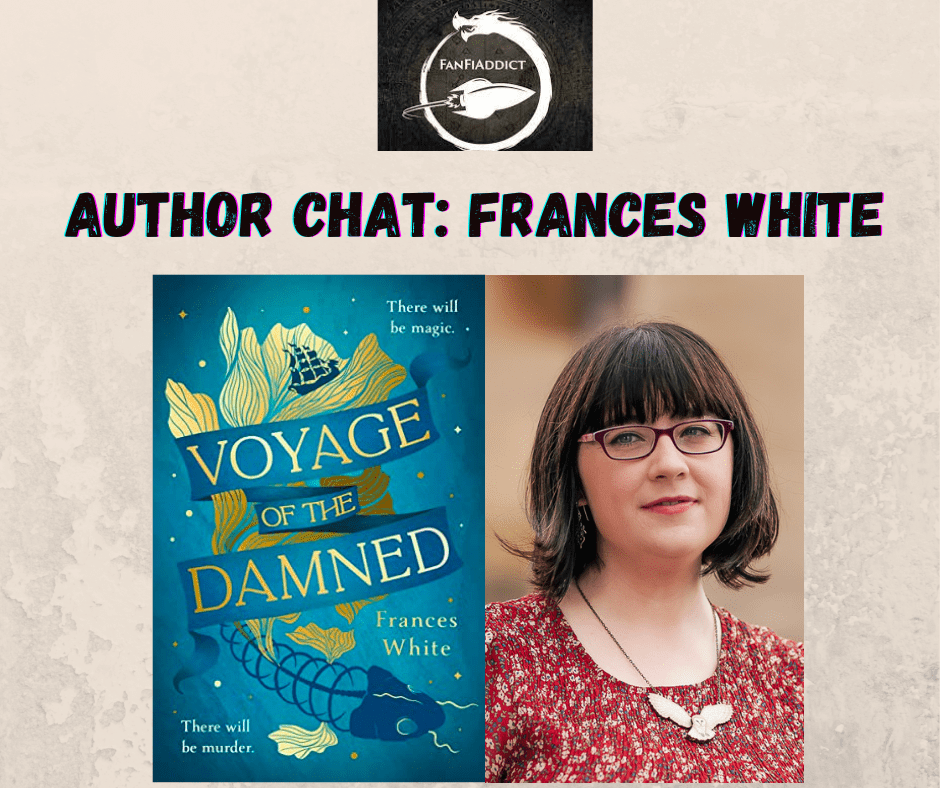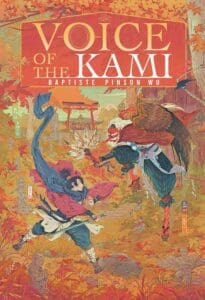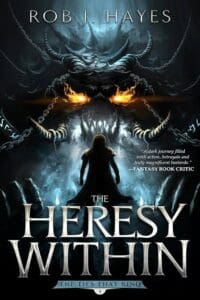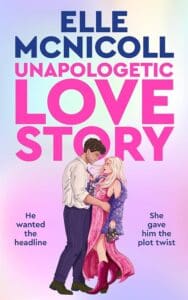
Born in Leicester and now residing in Nottingham, Frances is an English Literature and Creative Writing graduate from Royal Holloway University of London.
She has a soft spot for writing unlikely, flawed, messy heroes and loves mixing humour and heartbreak. She is an advocate for fat positivity and queer representation in fiction.
When not writing, Frances can be found sewing nerdy costumes for comic conventions or researching obscure historical facts.
Her debut novel Voyage of the Damned, a fantasy murder mystery from Penguin Michael Joseph, is published on the 18th January.
Here’s what I had to say about Voyage of the Damned in my review last month – reader, I loved it:
It is ridiculous that this book is a debut, because on three key areas – worldbuilding, (murder) plot and honest, deeply moving character work – White knocks this out of the park so hard they’ll still be searching for the ball when we colonise Mars.
You can find the synopsis and full review here. See the end of the interview for links to buy!
Q1) Hi Frances, thanks for chatting! I’m going to start with the most boring question that all debut authors get… tell me about your debut. I know you’ve previously described it as “a magical gay murder cruise”, which is one of the best elevator pitches I’ve heard, so if you want to just leave it at that I won’t blame you…
That does sum it up very well!
But for more detail, the book is set in the Empire of Concordia, which comprises of 12 different provinces, all united under the dragon emperor. To celebrate a millennia of peace, the twelve heirs of the provinces embark on a 12 day voyage to the sacred mountain.
All the heirs are graced with different secret magical abilities, apart from our MC, Ganymedes (or Dee), the heir of fish province, and lowliest of the low.
Dee wants nothing to do with the league of obnoxious assholes and is there purely to piss everyone off enough to force them to exclude him from a leadership role he has no interest in.
However, unfortunately for everyone on board, the heirs start dying off one by one. It’s up to our reluctant hero, Dee, to work out who is doing all that murdering.
The book has all the classic murder mystery tropes—a locked location, a cast of colourful characters, and a ticking clock, all sprinkled with a hefty dose of magic!
Q2) Your main character, Ganymedes, or Dee, is one of the most memorable and sympathetic main characters I think I’ve ever come across in fantasy. There are so many interesting things about him – he brings chaos, but he’s essentially the only decent adult in a book mainly filled with (seemingly at first) arseholes; he is bisexual, yet his tortured self-esteem has nothing to do with his sexuality; he is powerless, yet arguably the most powerful character in the book due to his humanity. (I could go on, but I’ll stop). What was the most important thing you wanted to get across to the reader about him?
Thank you! I’m so glad people like Dee.
Although the novel is primarily a murder mystery, if you cut it open it’s really a journey of self-acceptance. Dee is someone who has basically no belief in himself or his abilities. He can come across confident and self-assured, but in reality, he suffers from crippling self-esteem issues. This comes not only from within, but also from his upbringing, from not inheriting the magical gift that he is convinced proves he is worthy.
From the very first line of the first chapter Dee establishes himself as someone who wants to escape responsibility, who thinks he would be better off hidden away, alone in some remote place. He doesn’t fit in with his peers and he feels constantly like a fraud. All he wants to do is flee before this ‘truth’ of his ineptitude is discovered.
But because of the events of the book, he is forced into a position where he has to act, where he has to take on responsibilities, otherwise not only himself, but also innocents will be put in danger.
The dedication in the book is ‘for anyone who has ever entered a room and felt they did not belong.’ Dee is that person, plagued by self-doubt, who gradually comes to realise that his worth is not to be measured by what he is lacking, but instead that his uniqueness could be his greatest strength.
Q3) An interesting thing about this book is that almost all the characters on the boat are some combination of LGBTQ+ but… no one cares. Lots of people are mean to Dee, but (unless I’ve missed something) it’s never because he’s bisexual. This is a different approach to much of the queer representation in fantasy, where bigotry is a plot point. Was this a conscious effort on your part to have everyone gay and not make it a thing?
Yes it was. I think there is a place for exploring queer trauma in fiction, but for me I wanted to write a world without that. It has plenty of trauma but none of that comes as a result of being queer!
I suppose this could be seen as a form of escapism, our world is improving with its treatment and acceptance of queer people, but I think most queer person have experienced negativity or discrimination of some kind. I want queer people to have a world they can escape into where that isn’t a factor at all. Also, I’m the one creating the world and I just didn’t want to make one which was sexist or homophobic, I’ve seen enough of that in the real world and I personally don’t find that enjoyable to write, also it wasn’t necessary to tell the story I wanted to.
As you say, quite often if a character is queer that becomes a plot point. I set out to write a story where yes, the MC (and most of the cast) are queer but that’s not the focus of the plot at all. They also have magical powers and fight villains and chat with dragons, all while happening to be queer. I think the more readers see queer people just existing the further it normalises it, and hopefully ultimately helps with acceptance.
Q4) Dee is one of the only plus-sized leads I can remember in a fantasy, and what’s interesting is that he isn’t bothered about it; in fact it’s portrayed as an attractive quality throughout and has nothing to do with his torment. Was a positive body image portrayal something you actively sought out here?
Yes. This one is perhaps even closer to home than the previous question. It is very difficult to find stories that have plus size characters that are the hero. Usually fat characters, particularly in fantasy will fulfil one of two roles—villain or comic relief. Fatness is often associated with evil characters or bullies. Which always struck me as strange as in reality it’s usually the other way around—plus sized people are often targeted by bullies. And I think this myth of the fat bully actually impacts on plus sized children being taken seriously when they complain about being bullied.
But I digress, once you do find those rare books with plus-sized leads, it’s then nigh on impossible to find ones where their weight is not a huge focus. Books with fat leads will often focus on a journey of self-acceptance of their body, learning to love it.
These stories are important and needed, but they are not what I wanted to write. Like with the queerness mentioned above, I set out to write a story where the lead yes is fat, but that’s just one aspect of him, and far from the most important. This is the representation I would love to see more of—plus-sized people who have bigger concerns than obsessing about their weight—who have adorable kids to rescue and crimes to solve!
I think that’s also why I decided to push it one step further and make Dee love his body. It’s not merely tolerated or ‘accepted’ but actively appreciated not only by him but by his love interests (and others!) too.
This was very healing for me to write, on a personal level, as before Dee I never had a plus sized character who was so confident in their body. I really hope that it’s also comforting for others who struggle with body-image issues.
Q5) There are so many layers to the murder mystery in this book; the last time I came across one with such satisfying complexity I think was Stuart Turton’s masterpiece The Devil and the Dark Water. It feels like it must have been monstrously complicated to plan to the point where I genuinely don’t understand how you kept all the threads together. How did you plan this as a writer, and how much red string and floorspace was involved?
I can confirm, it was monstrously complicated. It felt like what I imagine making an elaborate tapestry feels like, you focus on just pushing the needle through over and over then you stand back and have no idea how the whole thing is staying together, never mind looks like what it’s meant to!
While writing this book I lived in a tiny one-bed flat. I didn’t have the floor or wall space needed so my own wall of deduction was a digital one!
I really love spreadsheets and spreadsheets basically held this novel together.
I had a very basic plan initially; I knew who the murderer was and how they were doing it. So I bashed out a first draft. Nobody should ever see this draft. It made no sense at all, but did help me to see what needed work (everything).
The first thing I realised was that my brain was not big enough to hold all the information I needed, hence—spreadsheets.
I had a spreadsheet dedicated to making sure the murder plot felt satisfying. I focussed on the three aspects detectives use when determining if they can charge suspects in criminal investigations—means, motive and opportunity. I wrote out all the facts of the mystery and grouped them under those headings. This gave me a visual of which of these three needed more attention.
Once that was completed, I was able to break it down further under each heading, determining the information Dee has to learn, how he learns it, clues that feed into the discovery and a final ‘eureka!’ moment. This helped me make sure that all the ‘mini-mysteries’ that fed into the overall main plot had the appropriate amount of attention and didn’t just feel tacked on!
This really is just skimming the surface, but I will briefly mention my favourite spreadsheet of all which was to keep track of all 12 of the characters’ movements. Every character had a row that detailed where they were and what they were doing each hour of the day. This helped me avoid any awkward situations like someone accidentally being in the exact room a murder was taking place in (and actually, helped me come up with more clues—such as realising ‘oh wow that person would have been nearby! Did they hear anything?’)
Q6) I’m going to take a strong guess that of all the characters in this book, you probably relate to Dee the most (as do a lot of us). But taking Dee out of the equation, which of the other characters do you feel are most like you?
You are correct Dee is the one I relate to the most! Now you’ve made it tricky!
There are aspects of all the characters that I relate to but I’ll probably say Tendai. She is very stubborn and can be highly competitive (don’t play board games with me), and although can be soft beneath the surface, struggles to fully trust people enough to let down her tough outer shell. She also likes to shit talk Dee, which I think I would also enjoy!
I would say I’m a lot less intimidating (and a lot less cool) than her, but I definitely relate to some of her traits! Most of all if I was on a murder boat I think I would act exactly as she does (no spoilers, you’ll have to read to find out what exactly that is…)
Q7) Voyage of the Damned is a standalone; and works very well as one, although I would love more books that explore this vibrant world. Why did you choose to do a standalone, and do you think you will ever revisit this world, if not in future novels then maybe short form stories?
Voyage of the Damned was written at a time when I was struggling immensely with my writing journey. Four of my books had died in the query trenches or on submission to publishers. The last three of these books were the first in different fantasy series, and the process of getting invested in a story spanning a multi-book series only having to put all those plans aside because the first book didn’t sell was slightly soul destroying.
I think the choice to then write a standalone came out of a desire to feel closure, to tell a complete story and have it have a conclusion, no matter if it sold or not.
I believe it was that desire to write a standalone that led to the idea for Voyage of the Damned. Because I needed a self-contained story that didn’t need any sequels, and murder mysteries are often tightly told plots told across one book so that felt like a great choice. (It helps that I’m also obsessed with them.)
I never like to say never, but I will say it’s unlikely I will revisit this world. Concordia and everything in it was created to be perfect to tell the story of Voyage of the Damned, and I’m not sure how well that will translate to telling a different story.
However, I do like the idea of shorter snapshots of the individual heirs lives before the ship. My biggest regret with having to kill so many characters was that there was so much more I wanted to explore in all of them! So who knows!
Q8) Moving on to your writer’s journey; all traditionally published writers’ journeys are pretty gruesome, from the endless query rejections to getting an agent to the somehow even more brutal submission process to get a book deal. But yours, which you’ve written very honestly on your blog before about, seems particularly stressful, with several books dying on submission. Can you tell us what that was like and how you got through it, and whether you think it’s made you a stronger writer? (or just mildly traumatised).
Yes, my journey was about as smooth as the voyage in my novel!
At the time it was very hard. In fact it’s probably the hardest thing I’ve ever done. Like Dee I’m not brimming with self-confidence so it felt like a constant battle of clinging onto enough of it to keep going against a sea of rejections telling me that actually, I wasn’t good enough.
I got through it with a mantra of ‘you’ve not failed until you stop trying.’ Cheesy, but it worked. I am a very stubborn person, which also helped! But I just love writing, it’s my greatest passion in life and if I stopped trying to do that I knew I would regret it. I just didn’t know what else I would do if I gave up.
I will say that this varies for all people, and there is no shame in stepping away or taking a break when your mental health is taking a hit. For me I found it more depressing when I wasn’t trying. I clung to hope desperately, and it kept me going.
With the benefit of hindsight, I can now say that absolutely it has made me a stronger writer, not only that but it helped me find my voice. Although I’m proud of my earlier works, Voyage of the Damned was the first book I wrote that felt completely authentically me. I had a revelation when writing it that this is the sort of thing I should have been writing all along. Of course, you can’t come to revelations like that without writing a bunch of other stories first, and my long and arduous journey meant I had the time and space to do it.
It also served to make me more resilient. The rejections and battles don’t stop once you sell a novel, they carry on through your career and I feel ready to face them with my years of experience beneath my belt.
I won’t pretend I’m not traumatised though!
Q9) Much has been made of the fact that being a debut author is, while a potentially life-changing and happy experience, also a remarkably (and arguably unnecessarily) gruelling one, with the mental health data to prove this. If you could change one thing about the process, what would it be?
I’m speaking on more general terms here than specifically myself and my publishers (who I honestly adore and feel very lucky to have such an amazing team).
But I would say communication. I am part of a debut group and I would say 90% of the traumas and stresses the authors experience is just because of a lack of communication between themselves and their publishers. I truly believe that writers just want to be kept in the loop. If writers were more consistently kept updated on what stage their books are at, when they’re going up for sale, how the sales are going, I think this would eliminate a lot of the frustrations debut authors have.
It’s like (I imagine) when parents leave children with babysitters, they want to be updated on how their babies are doing! Are they eating? Still alive? Books are authors’ babies except we hand them over for sometimes years at a time. We just want to be updated in what’s happening with them! It is the fear of the unknown, coupled with people who by their very nature have over-active imaginations that causes so many authors to assume the worst and stress in their debut year.
Q10) Finally, can you tell us anything about your next book? Please say there’s murder in it.
It’s not a murder mystery, but there is murder and there is mystery.
My next book which I’m currently writing leans a little more to the horror side. It concerns a group of children who wake up in a strange, eldritch labyrinth…missing their body parts. To escape, they must complete a series of impossible tasks.
Basically, if Voyage of the Damned was my take on a fantasy murder mystery, then this book is my take on a fantasy escape room.
I would pitch it with vibes of Stephen King’s It, Stranger Things (but fantasy!), and a sprinkling of Piranesi and Pan’s Labyrinth.
Hot damn you had me at Pan’s Labyrinth. Thanks Frances!
You can buy Voyage of the Damned at Amazon here, bookshop.org here, Penguin here and Waterstones here.




Leave a Reply